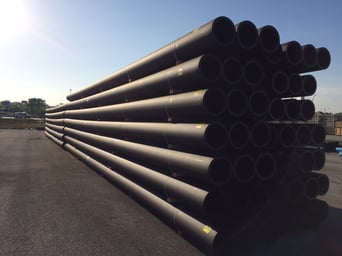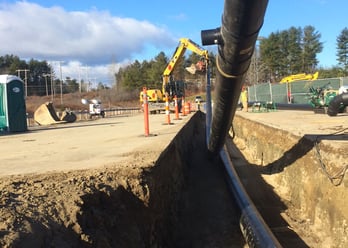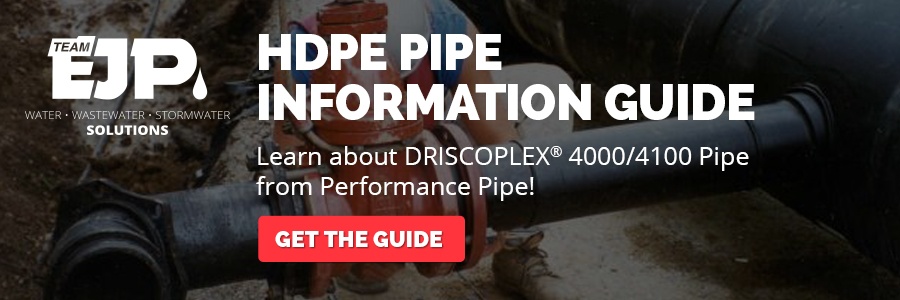Why Choose Polyethylene Pipe for Your Water Utility Project?
- Home
- Team EJP Blog
- Why Choose Polyethylene Pipe for Your Water Utility Project?
- Jul 19, 2017 8:50:21 AM
- Everett J. Prescott
When your water utility is getting ready to install new lines or replace aging ones, one of the best materials we've run into for the job is HDPE. High-density polyethylene pipe delivers strong, long-lasting performance with a light weight and price tag. Conservatively expected to last 50-100 years by the Plastic Pipe Institute. HDPE is making waves in the waterworks industry. Here's why you should investigate its potential further.
It's inexpensive and long-lasting
As with many plastic pipe options, HDPE won't break the bank. Because it comes in longer sticks or coils, fewer connections are required between pieces while the thermal fusion used to connect pieces means no time-consuming couplers are required to be installed.

It's tough but lightweight.
Unlike PVC, which can become brittle over time, HDPE remains flexible and strong while remaining lightweight and easy to handle. It holds up well in difficult soil conditions and can be used in a wide range of applications where other rigid pipe systems fall far short.
Imagine fewer connections that are leak proof.
HDPE is a unique material in water lines as it is able to be thermally fused in the field, allowing two lengths of line to be joined with no couplers, adhesive or similar materials. Studies have shown that when tested, 100% of line breaks occurred away from the fusion point, creating a strong connection that will not form a leak.
Doesn't have serious issues with corrosion or chemicals.
Imagine never having to worry about dealing with a Flint water crisis for your water utility. Because HDPE is plastic, it doesn't react to any but the strongest changes in pH or harshest of chemicals. This means the pipes you lay won't corrode, won't leak and won't pick up contaminants from the materials. In general, HDPE will deal better with the majority of situations where metal lines would fall short.
It's impact and fatigue resistant.

Unlike other types of plastic pipe, including PVC, HDPE retains its flexibility and deals well with impacts, even when the weather turns cold. Instead of having to worry about everything that goes on around the water line, you can simply trust that it's going to hold up well for years to come. It's also more resistant to motion fatigue, making it a great choice for areas where soil movement may be of concern.
It's a flexible option.
We've all seen trenches dug like someone tied a couple on over lunch, and they can be a pain to lay pipe in. Because HDPE retains its flexibility, it can deal with these types of situations much better than other types of pipe. Do you have a difficult situation where horizontal directional drilling is a must? HDPE can do that. Need a sliplining option for a failing line? It can do that too. In fact, it can also work well with floating, submerged or plow and plant installations with equal ease of assembly.
When you choose to use polyethylene pipe for your water utility's next expansion, repair or replacement project, you're providing your customers and your organization with the best material currently available. But if we haven't answered all your questions, the professionals at Team EJP are ready and waiting. Please feel free to contact us today for more information about how HDPE pipe can provide superior results on your next project.








